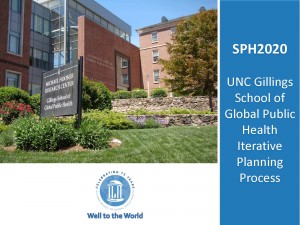Imagining the Future of Our School
In 2010, faculty, staff, students, alumni and friends of the UNC Gillings School of Global Public Health shared their knowledge, ideas, dreams and visions for what Gillings should be like in the year 2020.
Dean Barbara K. Rimer wrote Wake Up: It’s 2020 (PDF) to get people thinking concretely about the future.
Via virtual and in-person communications, people wrote, commented and voted on comments in 10 thought categories about what they most wanted for the Gillings School in the coming decade; these categories were then grouped into eight.
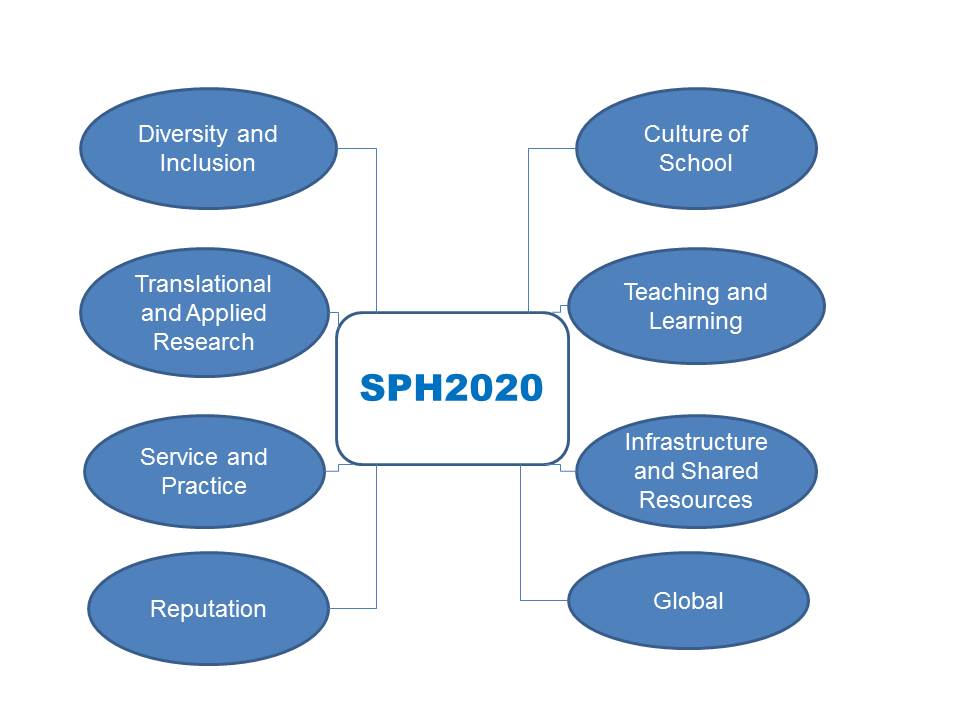
Following that effort, Gillings School leaders coalesced these thought categories even further. We’ve taken major strides in attaining these aspirations. Read on for examples of our outcomes.
Diversity and Inclusion: Key Actions and Achievements, 2010-Present
For a matrix that gives a visual overview of Gillings School diversity and inclusion actions and achievements, click here.
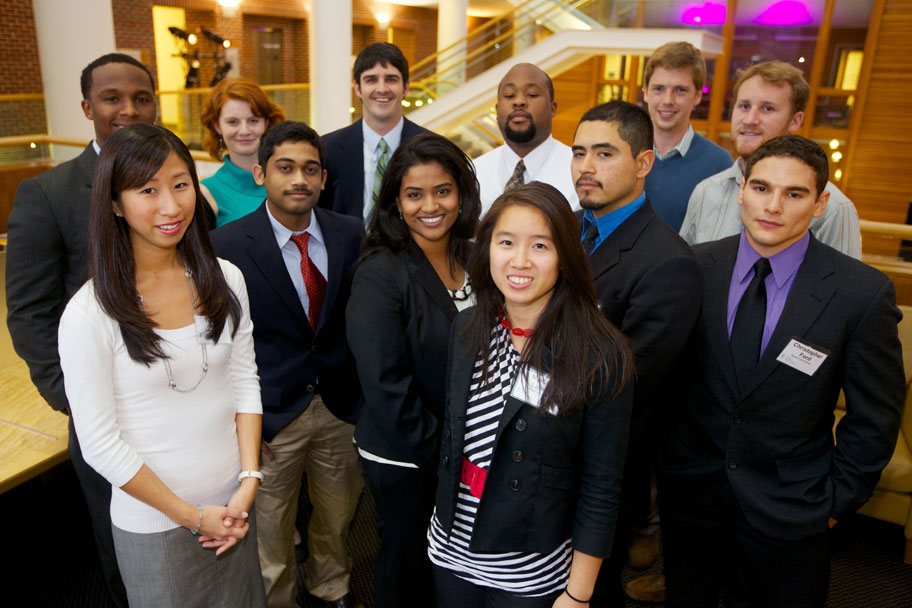
Past winners of the Annual Fund gather in the Armfield Atrium. The Fund provides scholarship assistance to students in all of the School’s eight academic departments and programs.
2011
- Diversity and Inclusion Task Force (DITF) convened (Fall 2010) and offered key recommendations (PDF) (Spring 2011).
- Dean’s Council and Department Chairs approved and posted a diversity statement and a strengthened EEO statement to the Gillings website (Fall 2011, Spring 2012).
2012
- Rumay Alexander, EdD, RN, clinical professor and director of multicultural affairs at the UNC School of Nursing, was appointed Diversity Champion for the School (September 2012).
- Awards processes for the School are updated (Spring 2012).
- Diversity recruitment specialist, Trinnette Cooper, was hired to support our diversity outreach and recruitment programs (Spring 2012) and strengthened pipeline programs through the Summer Public Health Symposium for high school students (2012-present), Project IMHOTEP for juniors and seniors (2012-present) and regular outreach at pre-college, college and professional levels.
- The School made modest gains in faculty, staff and student diversity in fall 2012 and again the following year
2013
- Admissions practices across departments were reviewed (Spring 2013), and each department adopted at least one new promising practice for the fall 2013 admissions season.
- Coordination across units increased around student recruitment (Academic Year 2013-14).
- The School’s Office of Student Affairs received support from the Jesse Ball DuPont Fund to extend pipeline programs (2013).
- School piloted the Ambassadors’ Program (Fall 2013), a training program for faculty, staff and students aimed at strengthening their recruitment skills; full roll-out was planned for fall 2014.
2014
- Curriculum options expanded as the School…
- Rolled out the course SPHG 690: Leading for Racial Equity (Fall 2014); graduate students from the UNC Schools of Public Health, Law, Business, Social Work, Information and Library Science, Nursing and the department of exercise and sports science enrolled as well as community members;
- Continued to sponsor the course HBEH 705/HPM 707 (Lesbian, Gay, Bisexual, and Transgender Health: A population perspective); and
- Continued to support other courses focused on health disparities including PUBH 756 (Addressing Health Inequalities in the U.S.), HPM 522 (Aging, Family and Long-Term Care: Cultural, Ethnic and Racial Issues) and EPID 799 (Social Justice and Equality: In search of John Cassel’s epidemiology).
- School increased transparency of diversity through…
- A new suite of web pages;
- The Gillings Program Search (GPS) tool, an online search mechanism featuring standardized information about all programs across the School with up-to-date diversity data on their profiles; and
- Reporting and discussing faculty, staff and student diversity metrics thrice annually at each of the School’s senior leadership meetings (Dean’s Council).
2015
- School supported the Health Advocacy at UNC/Black Lives Matter series co-led by our students (Spring 2015).
- An assessment was conducted of strengths within the School on health equity and health disparities including how we represent health disparities on our webpages (Fall 2015).
- American Public Health Association (APHA) webinar series on Impact of Racism was hosted (Fall 2015).
2016
- Established Diversity and Inclusion Working Group (Summer 2016), an all-volunteer group with representatives from Gillings School faculty, staff, students
and alumni. This group:
- Reviews recommendations of the Diversity and Inclusion Task Force and identifies emerging needs to prioritize Working Group activities.
- Plans and delivers events, trainings and resources that help increase diversity and enhance inclusivity at the Gillings School.
- Shares information and serves as a sounding board for issues related to diversity and inclusion across the Gillings School.
- Developed position description for assistant dean for inclusive excellence
- Initiated “Gillings Conversations” (Summer/Fall 2016), a series of reflection sessions on various topics related to inclusion and public health
- Periodically provided reflection boards in atrium on timely topics for students, faculty and staff to post insights and thoughts
- Student application and recruitment mechanisms strengthened to support principles of inclusion
- Program for first generation graduate students initiated (now transferred to Graduate School)
- Gillings School hosts two on-site “Mental Health First Aid” training sessions
- Reestablished dedicated space for Minority Student Caucus
- Established a prayer room in 16 Rosenau Hall
2017
- Workshop on creating inclusive classrooms offered at Gillings School (Spring 2017)
- Search committee empaneled for Assistant Dean for Inclusive Excellence (Spring 2017)
- Continued support for Minority Health Conference and National Health Equity Research Webinar (Spring and Fall 2017)
- New auditorium in Rosenau Hall featuring latest technologies and adaptive lay-out to provide maximal participation for all (April 2017)
- Safe Zone training at Gillings School (April 2017)
- Reflection session held in wake of Charlottesville, Virginia events (August 2017)
- Developed stronger course evaluation items to assess equity/inclusion in all Gillings courses: implemented for Fall 2017 courses
2018
- Kauline Cipriani, PhD, hired as assistant dean for inclusive excellence; initiates planning process for equity and inclusion at Gillings
Revenue Generation: Key Actions and Achievements, 2010-Present
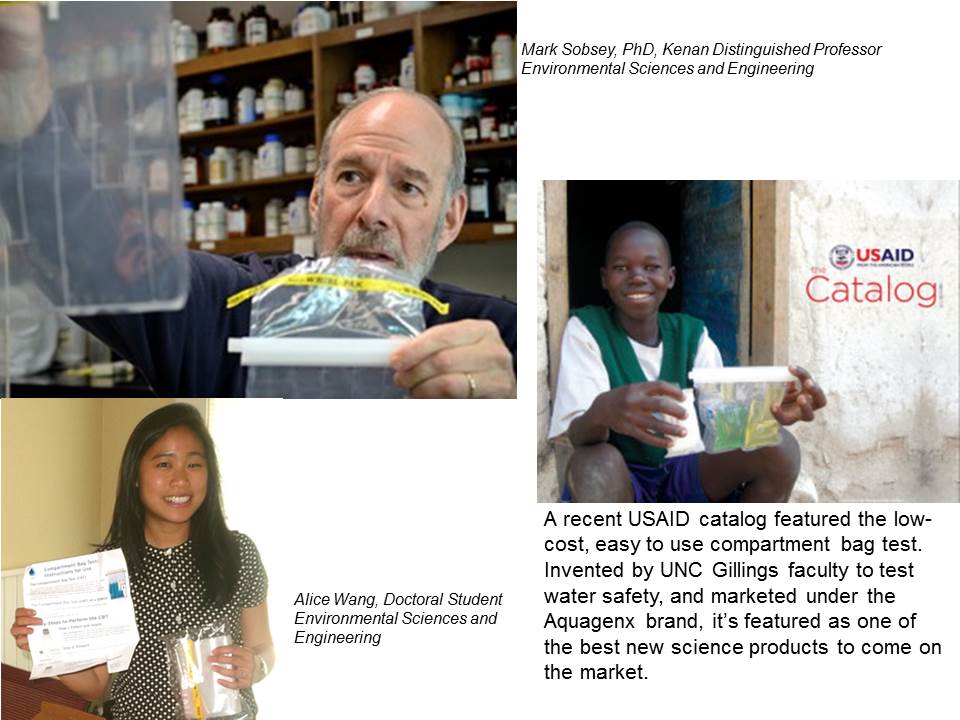
- Revenue Generation Task Force convened (Fall 2010) and offered key recommendations (Spring 2011).
- The School’s Research and Innovation Solutions group developed an intellectual property training program (Spring 2012).
- UNC-RTI Consortium on Implementation Science with RTI International established (2013). The Consortium aims to maximize the Gillings School’s research capacity in implementation science while building a key partnership. In 2015, 29 Gillings faculty members partnered with RTI International on 18 of RTI’s external grant/contract proposals (PDF) with $7.9 million in funding requests.
- Since 2008, 26 Gillings Innovation Labs have generated more than $30 million in follow-on funding, at least five times our original investment.
- In 2018, the Gillings School and RTI International launched a $500,000 initiative, the UNC Gillings-RTI Initiative to Maximize Partnerships and Catalyze Teamwork or IMPACT Seed Fund program. The broad vision for the IMPACT partnership is to become the “go to institutions” in a few defined areas. IMPACT intends to jumpstart teaming that will lead to large, impactful, interdisciplinary collaborative projects attractive to funders in the area of Environment and Health and that hold promise for laying the foundation for a fundamental breakthrough in the area of environment and health.
- Partnership with 2U, a premiere educational technology company to the MPH@UNC, launched in Fall 2018.
- Partnership with UNC-Asheville for a joint MPH, launched in Fall 2018.
Global School: Key Actions and Achievements, 2010-Present
2011-12
- Global School Task Force convened (Spring 2011) and recommended the creation of the “Gillings Global Gateway” to integrate, organize and promote the School’s global activities (Executive Summary (PDF), September 2012).
2012-13
- Global School Implementation Committee conducted a focus group with faculty and students from across the School to identify key issues, concerns and priority areas and also developed a pragmatic, phased implementation plan (Executive Summary (PDF), June 2013; complete Final Report (PDF), May 2013).
- Gillings Global Gateway™ opened its doors.
- Barbara (Bobbi) Wallace, MPH, was named Interim Executive Director and Peggy Bentley, PhD, Chamblee Distinguished Professor of nutrition, continued as associate dean of global health (June 2013).
- Task force on Global Strategic Partnerships developed recommendations on priorities and processes (PDF) for selecting and investing in global partners.
2014-15
- Gillings Global Gateway™ sponsored the Global Healthy Aging Summit (February 2014) with partners at Cambridge University, MIT AgeLab, UNC Kenan-Flagler Business School and Carol Woods Retirement Community. They formed the Global Aging and Technology Collaborative in summer 2015. This group is now developing courses and planning demonstration projects together.
- Jim Herrington, PhD, was appointed executive director of the Gillings Global Gateway™ and professor of the practice in health behavior in December 2015.
- The School partnered with French the Ecole des Hautes Etudes en Sante Publique (Spring 2015).
2015-16
- Global Online Master of Public Health (Go MPH) launched in summer 2015. This fully online, CEPH-accredited MPH offers concentrations in applied implementation science and water and population health.
- Intercultural lunch (spring 2015) connects diverse, global populations in the School.
- UNC-Gillings celebrates 10 years of partnership with FHI 360 on the FHI 360-UNC Public Health Fellowship program.
- Public Health Behind the Scenes podcast launched to highlight stories about people making a difference in public health in NC and around the world.
- WHO names UNC as lead partner in global effort to save millions of lives, with Dr. Herbert B. Peterson, MD, Kenan Distinguished Professor, Department of Maternal and Child Health leading the effort at Carolina.
- The Gillings School formalizes its partnership with Ecole des Hautes Etudes en Sante Publique (EHESP).
2016-17
- Launched 4 new summer internship programs with Carolina for Kibera in Kenya and 1 new internship program with IntraHealth in Tajikistan.
- Public Health Behind the Scenes podcast celebrates its 10th episode.
- Initiated the International Student Satisfaction and Needs Assessment Survey for current international students and alumni. Read the final report here.
- Produced the international student recruitment video titled “Why Gillings?“
- Theme for GillingsX 2017 is “Global Health: Mission Possible.”
- Gillings Global Gateway merges with Research and Innovations to become “Research Innovations and Global Solutions” at Gillings.
2017-18
- MPH Concentration in global health proposed and approved. Will be rolled out in Fall 2019.
Teaching and Learning: Key Actions and Achievements, 2010-Present
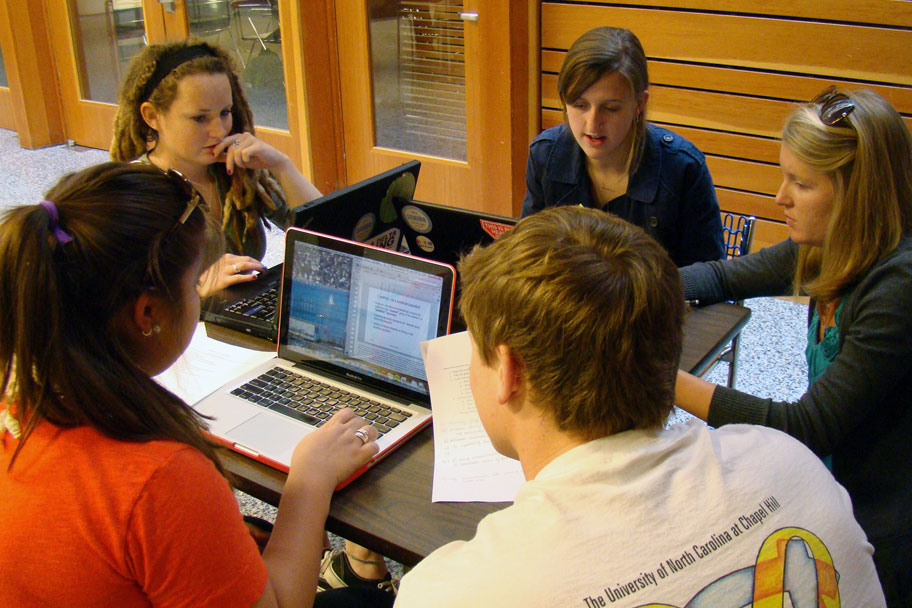
Students study in the downstairs atrium.
Courses
- Call for proposal was released to fund creation or redesign of interdisciplinary public health courses and/or new approaches to teaching (2012). The six funded were:
- Revamped core course in health behavior
- New course on diet, physical activity, smoking and obesity
- New course on public health entrepreneurship
- Seed funds for interdisciplinary course in health policy
- Seed funds for the Gillings Global Health Implementation Lab
Classrooms and Collaborative Spaces
- Three different classrooms were newly redesigned to feature latest learning technologies including expanded capacity for collaborative learning (Fall 2012, Fall 2013, Spring 2014). New classrooms are now the most popular teaching spaces in the School.
- There are new collaborative learning spaces in McGavran-Greenberg Hall called the Chaney Collaborative Commons (2014) and in Rosenau Hall (2015).
- With a generous gift from Joan Gillings, the large lecture hall (Rosenau 133) was completely redesigned and ready for classes in Fall 2017. It is now known as the Joan Heckler Gillings Auditorium.
Teaching and Learning
- Celebrate Teaching All Year! (2012-present) was originally conceived to be held in February but is now held at regular intervals throughout the year. Each event features sessions on innovative teaching methods. Each spring, one faculty member per department wins a Teaching Innovation Award. Based on student nominations, the award recognizes innovative teaching methods and teaching excellence.
- New schoolwide course evaluation measures were implemented to track whether and how the School is meeting or exceeding SPH2020 teaching and learning objectives (2011-present).
Gillings MPH Core
- The Gillings School initiated an effort to develop an all-new suite of integrated core courses for all students earning the MPH at the Gillings School (started 2015 and is ongoing). As part of the effort, the School:
- Hosted deans from ASSPH Schools (Columbia, Boston University and University of Southern Florida) that had recently updated MPH programs (Spring 2015);
- Hosted town hall meetings and visited all departments to solicit input from entire School (Spring 2015)
- Empaneled the MPH Core Planning committee (2015), which developed:
- Principles to guide all work on the MPH Core
- Draft competencies and framework for delivering the Gillings Integrated MPH Core
- Empanelled MPH Core Implementation Committee (2016-17), which developed detailed plans for delivering Gillings Integrated MPH Core, including fully developed competencies and structures for summer “acceleration camp,” plus fall and spring semesters
- Empanelled MPH Development Committee (2017), which developed detailed syllabi for Gillings MPH Core.
- Core course instructors selected in summer 2017 continued to refine course plans in 2017-18 and finalized syllabi and all plans by summer 2018.
- The new Gillings MPH Core rolled out in Fall 2018
The Gillings MPH
- In 2017-18, Dean Rimer appointed an MPH Steering Committee composed of faculty, staff and students from across the Gillings School. This governance committee for the MPH led a complete redesign of the structure of the MPH for the Gillings School, reducing our 8 separate MPH degrees, housed within departments, to one unified degree – the Gillings MPH – with 11 concentrations, or specialty areas. Each department continues to host a concentration, but several cross-departmental concentrations were approved as well. The Gillings MPH
- In Fall 2018, the Gillings School rolled out the Gillings MPH in an online version, MPH@UNC.
- In Fall 2018, the Gillings School launched a joint MPH with UNC-Asheville and the Mountain Area Health Education Center (MAHEC) in Asheville, NC. This partnership has potential to strengthen the public health workforce in western North Carolina.

